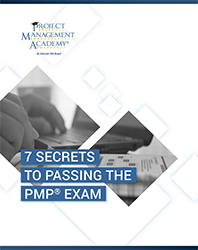
Project managers tend to view training and education as enhancements to their credentials, and those same credentials also benefit employers. Proven project management skills can help employers save money, prevent catastrophic project failures, and help maintain good client relations. With such far-reaching and significant benefits, most companies pay for their employees' Project Management Professional (PMP)® certification training and exam fees. In this article we provide tips to help you secure company reimbursement for your PMP exam prep expenses.

7 Secrets to Pass your Exam for PMP Certification
Unlock your earning potential, download 7 Secrets to Passing the PMP Exam.
Show them the value
According to the Project Management Institute (PMI)®, there are nearly 600,000 PMP credential holderes across the globe, with many more becoming certified every day. Simply look at any PM job board and you will find that the PMP certification is either mandatory or strongly preferred for most positions. There are good reasons why so many companies insist on hiring only PMP certification holders.
For over 30 years now, some of the brightest and most successful project managers from around the world have collaborated to share their knowledge and best practices for managing all aspects of a project, whether it be large or small, simple or complex. This body of knowledge has been refined, updated and enhanced periodically over that time. The framework is set forth in the Project Management Institute's A Guide to the Project Management Body of Knowledge (PMBOK® Guide) - Sixth Edition.
PMP certification holders understand and can fully utilize the standardized, structured sets of processes and tools laid out in this collection of knowledge. This benefits the company of course as these tried and true processes are then implemented across the organization to help ensure project success. Communications are enhanced, requirements are better understood and managed, quality is planned and managed closely, stakeholders are better managed, scope creep is avoided, and so on.

In short, "the PMP way" brings standardization, consistency, and a common vision/approach to project team members. This leads to more successful projects, which of course means more money for the business.
At the end of the day as a project manager, we all work for a business. Good business managers understand that certain business investments are essential to help bring about positive outcomes. For example, if a new software package came out that would increase worker productivity and cut costs, it would be an easy sell. Management realizes that the up-front costs of purchasing the software licenses will be re-paid many times over by enhanced productivity over the long term.
Investing in people should be no different. In fact, it should be more important than investing in other areas. Businesses can utilize the latest and greatest processes, technology and infrastructure, but these investments yield no returns without well-trained people to tie everything together. Thus, no effort should be made to upgrade other business systems until the people who use them have received the critical training they need.
Show them the money

Executives and business managers tend to listen to numbers more than words, so have the figures ready. By how much did your company's last major project go over budget? Think of the last time a customer was dissatisfied with your company's work - how much business did you lose from that customer afterwards? What does it cost your company when a project is delayed, or even cancelled due to poor project performance?
Good project management fundamentals save money on every project, period. And more importantly, they help preserve key client relationships over the long term. Here you want to draw upon your experience and knowledge of past performance to back up your points. If you are new to the organization, consult with your project management office and program/portfolio managers to gather this key historical information. If no information is readily available, consult PMI's website for various studies showing project performance metrics by PMP credential holders versus those without the certification (here are examples from NASA and IBM). Documentation is important here, so make sure you don't go in empty handed.
Finally, consider your organization's bigger-picture business goals. Are you bidding on large projects, or might you plan to in the future? If so, you can assume other firms seeking those contracts will be touting the PMP credentials of their project managers and key team members. By pointing out this competitive disadvantage, you will help your company's leaders see the bigger picture value of the certification, and how it can be a real force multiplier.
Ask at the right time

Your annual or semi-annual performance review presents an ideal time to discuss how PMP certification will further your own professional development and competencies, while also enhancing project and team efficiencies.
Consider also your training budget, and when it is released. Issuing your request right away will avoid that money being swallowed up by overages elsewhere down the line. Also be mindful of when your training budget expires. Too often people leave money on the table by not utilizing their full periodic training allotments. These are important investments you can make in yourself - at no cost to you - so make sure you know what is available and when.
Another good time to certify may be in between projects. The training will highlight tools and methods you may not have used in your last project, and you will be in a far better position to tackle your next project from start to finish.
Know exactly what you are asking for
When you ask your company to sponsor your training, have a detailed action plan ready. When is a good time to attend the boot camp? Consider where you should attend the course (Project Management Academy® offers regularly-scheduled courses in over 50 U.S. locations, along with instructor-led virtual courses for those not living near our locations or looking for weekend course options).
Also consider any travel expenses you might incur, and have those itemized and ready. If you manage other people in your organization, consider whether they should also receive the training, and why it makes sense for them.
If others in your organization should receive the training and certification, consider the benefits of a private, on-site training at your facility (or a facility of your choosing). These in-house trainings are outstanding options for a few reasons:
- They offer substantial savings over public courses
- They require no travel by the students
- They are generally customizable in terms of how many days they last, and the course durations for each day
- They allow teams to train together, which helps everyone learn the material in the specific context of their workplace and any unique challenges they face
For more information regarding the benefits of in-house training, refer to our website.
Summary
In conclusion, to secure reimbursement for PMP certification training you must first demonstrate the value of the PMP cerdential; both for your professional development and your company's longer term success. Next, you need to present your request at the appropriate time, and include all relevant details such as when you will be trained, what it will cost, and who else should receive training. Finally, you need to follow up on your request periodically, to help ensure your critical training remains a topic of discussion and a strategic priority. Reinforce the value of the certification through key business metrics and how they would be positively affected by this training. Following these simple steps will go a long way in ensuring that you receive this important training without having to bear the costs alone.
One final point: many companies like to see a quote in order to approve your request for training funds. Our shopping cart system allows you to easily generate a quote. Simply follow the register/checkout process and on step 2 select the Billing Type of "Quote/Purchase Order/Check". This will generate a Quote that you can use to request funding.


 New Horizons
New Horizons
 Project Management Academy
Project Management Academy
 Six Sigma Online
Six Sigma Online
 Velopi
Velopi
 Watermark Learning
Watermark Learning
 Login
Login





 New Horizons
New Horizons
 Project Management Academy
Project Management Academy
 Velopi
Velopi
 Six Sigma Online
Six Sigma Online
 Watermark Learning
Watermark Learning